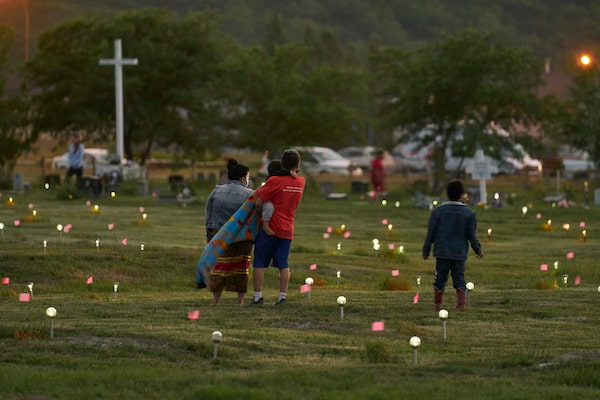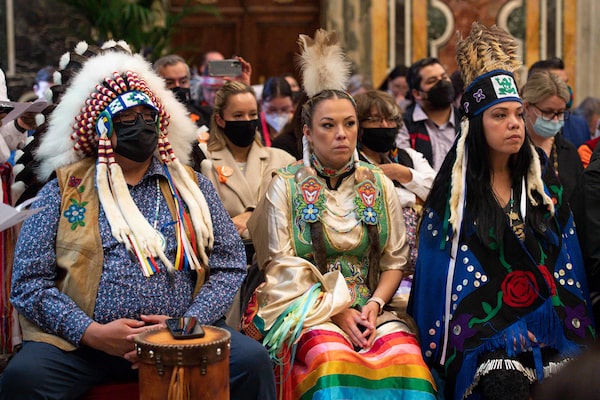
A family walks through a field where flags and solar lights now mark the site where human remains were discovered in unmarked graves at the former Marieval Indian Residential School site on Cowessess First Nation, Sask., on June 26, 2021.GEOFF ROBINS/AFP/Getty Images
The federal government abandoned its 2015 appeal of a court ruling that released the Catholic Church from its financial obligations to residential school survivors because it believed there was a “low likelihood of success,” according to records obtained by The Globe and Mail.
For almost seven years, Indigenous leaders have sought answers to why Ottawa dropped its legal action against the Catholic Church, which was short $21.3-million in a fundraising campaign meant to benefit survivors. Documents released last week by the Department of Justice through an access-to-information request provide some insight into the decision.
In a memorandum to then-justice minister Jody Wilson-Raybould dated April 21, 2016 – five months after the appeal was abandoned – Duaine W. Simms, then an assistant general counsel and director of the Aboriginal affairs portfolio at the Department of Justice, wrote that there “would be a low likelihood of success of an appeal from factual findings and conclusions, and even if successful, an even lower chance of success in finding legal levers to force the Catholics to relaunch a moribund fundraising campaign.”
Following the Pope’s apology, Canadian Catholics need to step up
Reconciliation does not stop at the Vatican. It will not end until we bring all our children home
“In finalizing the [Indian Residential Schools Settlement Agreement], all parties agreed to support the promotion of healing, education, truth and reconciliation, and commemoration. While Canada can expect that the parties will be guided by these intentions, Canada cannot prevent other parties from taking a narrow view of their legal obligations.”
The memorandum was written the day after a Globe story on the dropped appeal, and other records in the release suggest the document was drafted to brief Ms. Wilson-Raybould on the issue.
Indigenous leaders have said the decision to abandon the appeal has had long-lasting consequences for the reconciliation process between Indigenous communities and the Catholic Church.
In November, Crown-Indigenous Relations Minister Marc Miller said he wanted to “get to the bottom” of why Ottawa dropped its appeal.
In an interview this week, Mr. Miller said the decision was “really regrettable” in hindsight.
“It’s an unfortunate timeline in the best of scenarios, but it’s also, in my mind, reflective of the greater pattern of what I see as a moral failure, whether you’re talking about the government of Canada or the Catholic entities involved,” he said.
The Catholic Church ran the majority of Canada’s federally funded residential schools, which operated for more than a century, until the 1990s. At least 150,000 Indigenous children were removed from their families and forced to attend the schools – a system designed to strip them of their traditions, languages and cultures. More than 4,000 children died from malnutrition, abuse, disease or neglect under what the Truth and Reconciliation Commission has called a policy of cultural genocide.
The church was a party to the Indian Residential Schools Settlement Agreement, a landmark legal deal struck in 2006 between survivors, religious institutions and the federal government. Under the agreement’s terms, the church would pay $29-million in cash to the Aboriginal Healing Foundation, an Indigenous-led charity; provide $25-million worth of in-kind services to Indigenous communities; and raise an additional $25-million through a national fundraising campaign.
But it failed in all three commitments, experts told The Globe last year: It came up $1.6-million short on its cash promise; concerns were raised about its in-kind contributions after The Globe obtained a list detailing the services performed; and it ultimately raised just $3.7-million in its $25-million campaign, citing financial stresses on parishes and dioceses. (A 2021 Globe investigation found that the Catholic Church in Canada had at least $4.1-billion in assets in 2019.)
Seven years after the agreement was struck, Ottawa learned that the Aboriginal Healing Foundation was still owed money, so it took the church to court. Over the course of 18 months, the case morphed into a dispute about whether federal lawyers had agreed to release the church from the entirety of its financial obligations in exchange for a $1.2-million settlement to the charity. In July, 2015, Justice Neil Gabrielson of the Saskatchewan Court of Queen’s Bench ruled a deal had indeed been struck, effectively releasing the church from the 2006 settlement agreement.
Ottawa filed a notice of appeal on Aug. 14, 2015 – 12 days after Parliament was dissolved and an election was called – and spent the next several months finalizing its deal with the church, the newly released records show. After securing the $1.2-million, the government formally abandoned its appeal on Nov. 10, 2015, mere days after Justin Trudeau’s Liberal Party replaced Stephen Harper and his Conservatives, who had been in power since 2006.

Members of Indigenous delegations listen to the Pope's speech during an audience at the Vatican on April 1.Supplied/AFP/Getty Images
Given the significance of the residential schools settlement and the fact that the church never fulfilled its obligations, the government should have fought harder to hold the church to its promises under the settlement agreement, said Mary Ellen Turpel-Lafond, a former Saskatchewan judge who is now a law professor and academic director of the Indian Residential School History and Dialogue Centre at the University of British Columbia.
“One would expect them to go to the wall on that front, but they didn’t,” she said. “Not only did they not go to the wall, but they flew the flag and said, ‘Okay, we’ll just leave it as it is because there’s no prospects of ever getting it.’ How is that reasonable?”
Instead, Prof. Turpel-Lafond said, the government “left it in the realm of ‘Let them do the right thing if they’re so motivated’” – despite the fact that the government was responsible for administering the settlement. “It’s really challenging to accept this as an explanation,” she said of the reasons outlined in the memorandum to Ms. Wilson-Raybould.
Survivors should have been involved in the government’s decision, Prof. Turpel-Lafond said. “All of this was decided without survivors being present in the courtrooms.”
Prof. Turpel-Lafond called for a public, independent review, commissioned by the Attorney-General of Canada, of the government’s decision-making in the case. “This matter needs to be properly reviewed,” she said. “It’s not finished.”
When asked about such a review, Mr. Miller said he’d “have to think about it in a little more detail.”
“We have to ask ourselves what that review would ultimately yield,” he said, given the fundraising announcements by the Catholic Church last year.
In September, the Canadian Conference of Catholic Bishops announced a new, $30-million fundraising campaign to benefit Indigenous communities and residential school survivors after the apparent discovery of unmarked graves near several former residential school sites across the country drew international attention and renewed scrutiny of the Catholic Church.
Last week, a delegation of First Nations, Métis and Inuit leaders went to the Vatican for meetings with Pope Francis. On Friday, he apologized for the abuses Catholics perpetrated against Indigenous children at residential schools. He vowed to visit Canada this year and is expected to make an apology directly to survivors and families, addressing one of the Truth and Reconciliation Commission’s 94 calls to action.
Donald Worme, a Saskatoon-based lawyer and former lead counsel for the commission, said the government’s court loss and dropped appeal are “still very bothersome” several years later.
“It may well be that the appeal may not have had very much of a chance of success,” Mr. Worme said, but the decision to drop it “belies what may be considered a certain ineptitude” on behalf of the government. “This is the continuing privileging of the settler religion over Indigenous people,” he said.
“The Catholics have to be compelled to do the right thing.”
Pope Francis made a historic apology Friday for the abuse of Indigenous students in Canadian residential schools run by the Catholic Church. Indigenous delegates at the Vatican say the apology was needed, but are waiting for the Pope to make one on Canadian soil.
The Globe and Mail
Our Morning Update and Evening Update newsletters are written by Globe editors, giving you a concise summary of the day’s most important headlines. Sign up today.